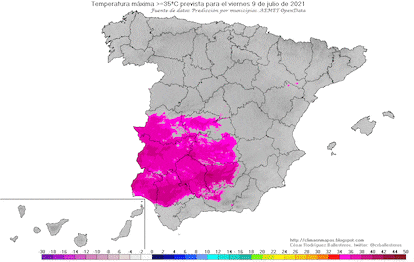Spain braces for ‘extreme’ weekend heat with temperatures set to top 44ºC
According to the national weather agency Aemet, parts of the country will be among the hottest on the surface of the planet this Sunday


Spain is bracing for a weekend of record-breaking high temperatures, with the thermometer set to top 44ºC in some areas. “It will be the hottest weekend that we have so far had this summer,” said Rubén del Campo, the spokesperson for Spain’s national weather agency Aemet, at a press conference on Friday. “It will be a brief, but intense episode.”
On Saturday and Sunday, large inland areas of the northern half of Spain are expected to see highs of more than 35ºC, while in the Ebro Valley and the southern half of the country, such as the Guadalquivir Valley, temperatures could soar to between 44ºC and 45ºC. The heat is set to continue at night in some areas, with the temperature in the provinces of Jaén, Granada, Almería and Málaga forecast to exceed 25ºC.
The “extremely high temperatures” will peak in most of mainland Spain on Sunday, then plummet on Monday
“It is going to be a dramatic heat. They are extreme temperatures that even in the Guadalquivir Valley, which is already very hot, are rarely reached,” said Del Campo, who warned the public to take precautions.
The temperature is forecast to be between 5ºC and 10ºC above average across the country, and more than 10ºC above average in western Andalusia, Navarre and La Rioja.
The “extremely high temperatures” will peak in most of mainland Spain on Sunday, then plummet on Monday as an Atlantic trough sweeps a mass of hot air from Africa to the east. This will lead to a significant rise in temperatures in the Balearic Islands, which could see highs of 35ºC and 40ºC on Monday – up to 10ºC above average. The trough is also set to affect inland areas of Murcia and other parts of the southeastern peninsula, with highs of more than 44ºC forecast. Meanwhile, in Málaga, the thermometer could reach 40ºC.
“It will be really anomalous,” explained Juan Jesús González Alemán, a researcher and meteorologist for Aemet, in reference to Sunday’s forecast. “Large parts of the peninsula will enter one of the hottest regions on the surface of the planet. It will be an extension of the traditional summer ‘heat belt’ that usually extends from Algeria to India.”
The conditions – a result of a stable atmosphere, strong summer insolation and the entry of warmer air from Africa – do not yet qualify as a heatwave, which is defined by three requisites: extreme temperatures up to 5% higher than the maximum temperatures, affecting 10% of weather monitoring stations in the country, and which last at least three days.
Saharan dust intrusion in the coming days that will affect Iberian Peninsula, Maghreb, western Sahel, Cabo Verde and Canary islands. Find more forecast products here: https://t.co/TbIaux5Dhk and our probability maps: https://t.co/2qDUU6GX9T pic.twitter.com/KfkTW9TbNu
— Barcelona Dust (@Dust_Barcelona) July 9, 2021
The Canary Islands is the closest to seeing a heatwave, with temperatures expected to be between 5ºC and 10ºC above average until Wednesday. In the south of Gran Canaria, the thermometers could soar to more than 40ºC on Sunday. Clouds of Saharan dust are also expected to affect the archipelago as well as mainland Spain.
The Aemet has issued orange alerts – the second-highest level on the scale – for the valleys of Tajo, Guadiana and Guadalquivir. These warnings may be elevated to red ahead of Sunday if conditions worsen. Spain recorded its highest temperature ever in July 2017, when thermometers in Córdoba soared to 46.9ºC.
English version by Melissa Kitson.
Tu suscripción se está usando en otro dispositivo
¿Quieres añadir otro usuario a tu suscripción?
Si continúas leyendo en este dispositivo, no se podrá leer en el otro.
FlechaTu suscripción se está usando en otro dispositivo y solo puedes acceder a EL PAÍS desde un dispositivo a la vez.
Si quieres compartir tu cuenta, cambia tu suscripción a la modalidad Premium, así podrás añadir otro usuario. Cada uno accederá con su propia cuenta de email, lo que os permitirá personalizar vuestra experiencia en EL PAÍS.
¿Tienes una suscripción de empresa? Accede aquí para contratar más cuentas.
En el caso de no saber quién está usando tu cuenta, te recomendamos cambiar tu contraseña aquí.
Si decides continuar compartiendo tu cuenta, este mensaje se mostrará en tu dispositivo y en el de la otra persona que está usando tu cuenta de forma indefinida, afectando a tu experiencia de lectura. Puedes consultar aquí los términos y condiciones de la suscripción digital.








































